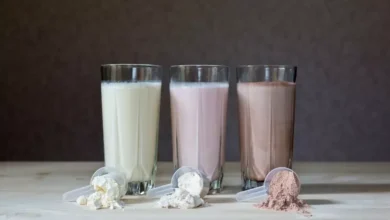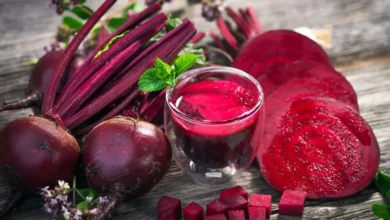Smart Nutrition: The Definitive Food Guide for Muscle Recovery Athletes

For athletes and intense exercisers, success is not just about training time; it is forged during the rest period and, crucially, in muscle recovery. The post-exercise phase is when the body repairs itself, rebuilds damaged fibers, and stores energy for the next challenge. Correct nutrition is the most powerful tool to optimize this process.
Post-workout nutrition must have a triple goal: replenish glycogen (spent energy), repair muscle tissue (proteins), and combat inflammation (antioxidants). Failing in any of these aspects can lead to chronic fatigue, decreased performance, and increased risk of injury.
This practical guide focused on Muscle Recovery Athletes details the essential foods and nutrients that should be part of the diet of anyone seeking to push their body to the limit safely and efficiently, transforming the dinner table into a true performance arsenal.
READ ALSO:
- Apple Carrot Blueberry Juice: A Nutritious Drink for Energy and Wellness
- 3 Shakes for Rapid Muscle Growth: Vitamins for Fast Hypertrophy
Follow our PAGE
The Pillars of Muscle Recovery Athletes
Sports nutrition science divides the recovery process into two fundamental pillars that must be addressed in the post-workout meal, especially within the “window of opportunity” (the first two hours after exercise).
The first pillar is Energy Replenishment. During intense exercise, the body consumes glycogen reserves stored in the muscles and liver. Without adequate carbohydrate replenishment, the athlete may feel exhausted, and the body may resort to breaking down muscle proteins for energy. The ideal ratio, often recommended by nutritionists, is 3:1 or 4:1 (Carbohydrate: Protein).
The second pillar is Muscle Repair and Reconstruction. Proteins, composed of amino acids, are the building blocks needed to repair the damage caused to muscle fibers during training. Ingesting high-quality proteins stimulates muscle protein synthesis (MPS), essential for hypertrophy and repair.
Essential Foods for Tissue Repair and Strength
Protein intake is vital. However, one must choose sources that offer a complete profile of essential amino acids.
- Eggs: Considered the gold-standard protein due to their high bioavailability. They contain all essential amino acids and are a quick and accessible source.
- Fatty Fish (Salmon, Sardines): In addition to high-quality protein, they are rich in Omega-3 (EPA and DHA). Omega-3 is a powerful anti-inflammatory agent that helps reduce muscle soreness (DOMS) and oxidative stress.
- Lean Meat and Chicken: Excellent sources of protein, iron (essential for oxygen transport), and natural creatine (in red meat), which helps restore ATP levels (cellular energy).
- Greek Yogurt and Cottage Cheese: Offer a high concentration of casein protein (slow digestion, ideal for nighttime) and whey protein, as well as calcium, which is fundamental for muscle contraction.
Smart Carbohydrates: Quick and Sustainable Replenishment
The choice of carbohydrates is crucial. One must balance the speed of absorption to replenish glycogen quickly without causing unnecessary insulin spikes.
- Sweet Potato and Yam: Although they are complex carbohydrates, they are digested efficiently and offer vitamins and fiber, stabilizing energy. They are ideal for the solid post-workout meal.
- High Glycemic Index Fruits (Banana, Mango, Raisins): Quick sources of natural sugar (fructose and glucose) that are rapidly absorbed, accelerating glycogen replenishment. They are perfect in post-workout smoothies. Banana, in particular, is rich in potassium, which prevents cramps.
- Oats: A source of complex carbohydrate and fiber that ensures satiety and keeps energy stable for longer.
Fighting Inflammation: Antioxidants and Minerals
Muscle damage is accompanied by inflammation. Foods rich in antioxidants help scavenge free radicals and speed up recovery.
- Berries (Cherries, Blueberries, Raspberries): Extremely rich in antioxidants (anthocyanins). Tart cherry juice has been scientifically linked to reducing muscle soreness and damage in endurance athletes.
- Spinach and Kale: Sources of iron, calcium, and magnesium. Magnesium, in particular, is vital for relaxing muscles and promoting restful sleep.
- Ginger and Turmeric: Spices with potent anti-inflammatory properties. Including them in smoothies or main meals helps reduce soreness and accelerate tissue recovery.
Hydration and Electrolytes: The Forgotten Factor
Recovery is not just about solids; rehydration is crucial. Water not only replenishes lost fluids but also helps transport nutrients.
- Coconut Water: Rich in electrolytes (potassium, sodium) lost through sweat. It is a natural and less sugary alternative to many sports drinks.
- Milk (with Chocolate): Although it seems unusual, chocolate milk is often cited as one of the best recovery drinks because it provides the 4:1 carbohydrate-to-protein ratio, in addition to water and electrolytes.
Conclusion
Muscle Recovery Athletes is a complex process that demands discipline in nutrient intake. The diet must be strategically planned to include the right balance of proteins (for rebuilding), complex and simple carbohydrates (for energy), and antioxidants (for inflammation).
By prioritizing foods like salmon, eggs, sweet potatoes, and berries in their post-workout “window of opportunity,” athletes can ensure their muscles repair faster, energy reserves are ready for the next session, and the risk of injury is minimized. Smart recovery is the true secret to athletic longevity and success.

Hello! My name is Alan Teixeira and I am passionate about helping people live healthier, more balanced lives. From mindful eating to daily habits that promote physical and mental well-being, I believe that small, consistent changes can lead to powerful transformations.
I created this blog to share practical tips, reliable information, and thoughtful insights that can inspire you to take better care of yourself—with balance, mindfulness, and positivity.
If you are looking to improve your health, nourish your body, and build a lighter, more fulfilling routine, you are in the right place. Welcome!





